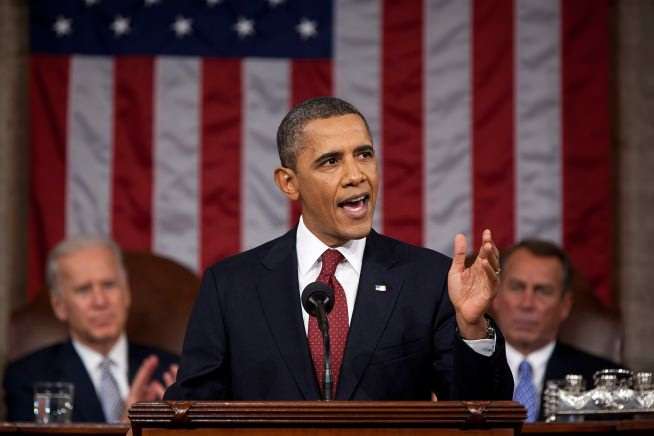Obama's Empty Tax Hike Populism

Over the weekend, the White House revealed that President Obama would propose $320 billion in additional taxes during tonight's State of the Union address.
Rest assured they're not going to happen—not while Republicans control Congress. This is about political signaling more than it's about policy; it's a tax-hike wish list put forth by a president who wants people to know that he favors higher taxes, not a genuine attempt at concocting an overhaul of the tax code that could actually pass. It's game day, and President Obama wants to show everyone to know which side he's rooting for, so he's showing up early in a jersey that says Team Tax Hikes.
The White House fact sheet makes it clear that Obama is rooting for a particular kind of tax hike populism. The opening line declares that "middle class families today bear too much of the tax burden because of unfair loopholes that are only available to the wealthy and big corporations." The rest of the document reads much the same way. But Obama's populist tax hike rhetoric doesn't always capture the full reality of the tax hikes he's proposing.
For example, Obama will propose ending the "stepped-up" basis "loophole" in the capital gains tax. According to the fact sheet, President Obama will propose closing "the trust fund loophole—the single largest capital gains tax loophole—to ensure the wealthiest Americans pay their fair share on inherited assets."
That's one way of putting it. Another way of putting it is that it is essentially a brand new tax on inheritance. It's a proposal that either doesn't understand or doesn't care about the primary reason the tax code employs the stepped-up basis calculation. As Ryan Ellis of American for Tax Reform explains:
Under current law, when you inherit an asset your basis in the asset is the higher of the fair market value at the time of death or the decedent's original basis. Almost always, the fair market value is higher.
Under the Obama proposal, when you inherit an asset your basis will simply be the decedent's original basis.
Imagine buying a piece of property in 1980 for $100,000. It's worth a $400,000 now. If you sell that piece of property before you die, you'll pay capital gains on $300,000—the difference between the two. But if you pass that on to your daughter, the value of that property will be "stepped up" to $400,000. The way it works today, if she sells the property for $440,000, she'll pay capital gains on $40,000—the amount it appreciated while in her possession. Under Obama's proposal, she'd be liable for capital gains on $340,000. (The Wall Street Journal has more on how this works in practice.)
As Ellis argues, it basically amounts to a "second death tax."
There are exemptions for most households, but this misses the larger point: the whole reason we have step up in basis is because we have a death tax. If you are going to hold an estate liable for tax, you can't then hold the estate liable for tax again when the inheritor sells it. This adds yet another redundant layer of tax on savings and investment. It's a huge tax hike on family farms and small businesses.
Another provision outlined in the White House fact sheet would "roll back expanded tax cuts for 529 education savings plans that were enacted in 2001 for new contributions." Those 529 education plans are college savings plans geared toward the broad middle class—the folks his tax plan is supposedly intended to boost—the value of which was dramatically expanded by a 2001 tweak that stopped taxing those plans as ordinary income once withdrawn.
As Ellis notes in a separate post, the amount of money families put in those college funds following the 2001 reform doubled over a year, and then continued to grow rapidly. As Ellis writes, Obama's plan would undermine the value of those plans:
The Obama plan aims to turn back the clock, once again taxing earnings growth in 529 plans as ordinary income. This is a direct and clear tax increase on middle class families sacrificing to save for college, and it's likely to result in a mass divestment from this type of savings.
The White House proposal also calls for raising the capital gains rate from its current rate of 23.8 percent (including a 3.8 percent surtax built into Obamacare) to 28 percent. The White House describes this as a plan to "raise the top capital gains and dividend rate back to the rate under President Reagan." It's true that in 1986 Reagan supported a law raising the capital gains rate to 28 percent. But that was in the context of a bipartisan deal to significantly overhaul (though not completely wipe out) the tax code, one that the Reagan White House worked on diligently for years.
Similarly, Obama's fact sheet declines to mention is that it was a Democratic president who lowered the capital gains rate back down to its current level: Bill Clinton signed the reduction into law as part of a package of tax cuts in 1997. That too was passed on a bipartisan basis as part of a broader package of federal tax reforms.
That's obviously not what's going on here. Obama isn't after plausible reforms that could pass on with support of the opposition party. He's not after anything that could pass, or even lead to a compromise that could pass—at least not while he's in office. Which means that, despite the populist rhetoric, he's not actually looking for ways to reduce the tax burden the middle class. He's looking to make a speech, not do the hard work of negotiating real reforms.


Show Comments (179)